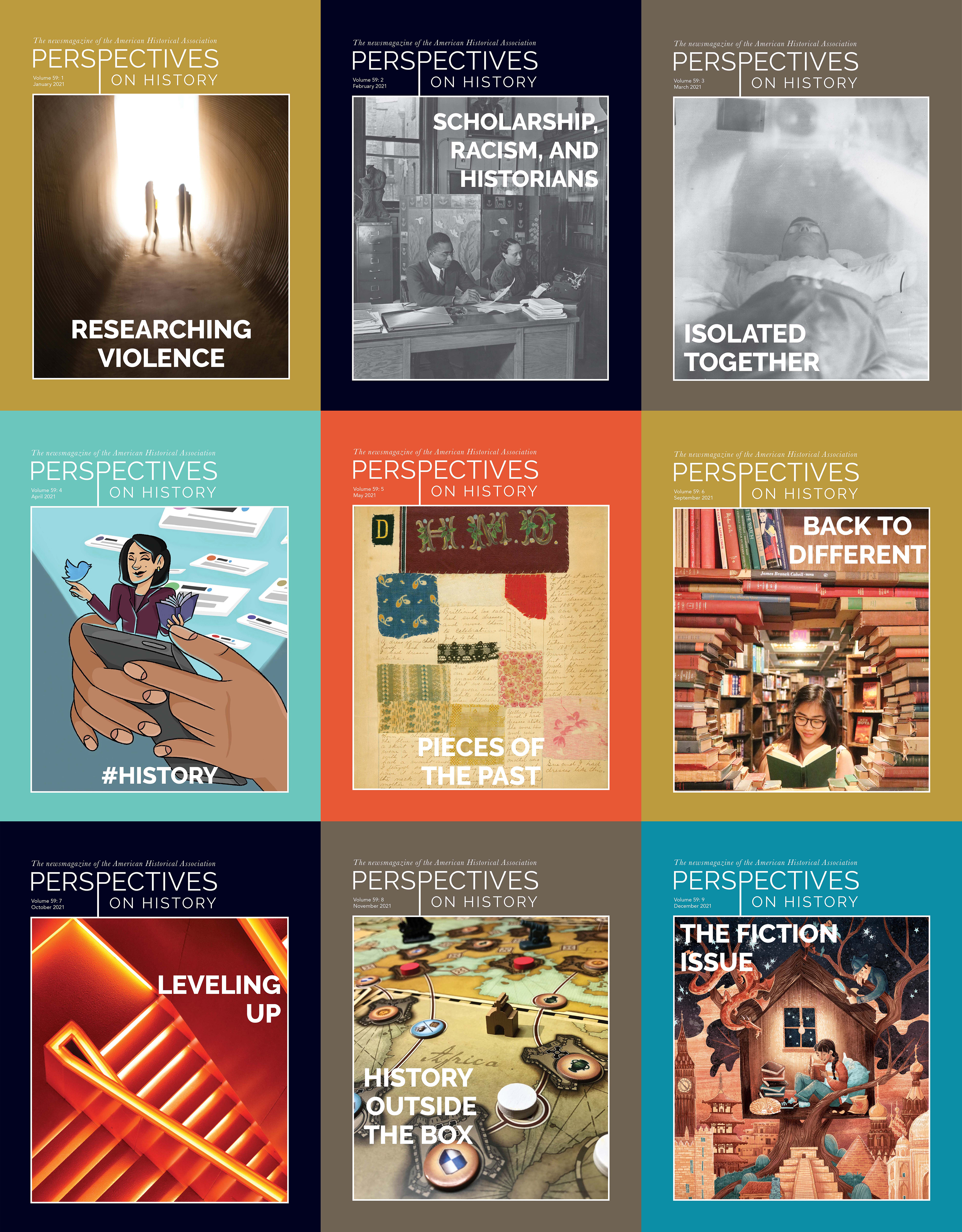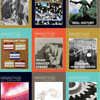Perspectives on History cultivates the community of historians and promotes our work. In 2021, a year in which the world continued adjusting to a new normal, the publication showcased the vital work and adaptability of historians. Perspectives published pieces on how instructors reimagined the classroom by becoming the primary source, combining the classroom and students’ living rooms, and inviting active scholars into the K–12 classroom. We took a look at the world around us to publish pieces contextualizing current events, covering topics from divisive concepts to records retention and Juneteenth. Amid these important discussions, historians found fun ways to stay connected, some through bowling, others on Twitter through hashtags and movie nights, and blogging.

The nine print issues of Perspectives on History covered topics related to teaching, the COVID–19 pandemic, divisive concepts, historical fiction, and more.
We are excited to share new articles with our readers in 2022. For now, we’re enjoying a chance to look back on the work historians produced throughout the past year.
As our own way to ring in the New Year, the team behind Perspectives pulled together a list of the most popular articles from each month. Enjoy this look back at what resonated with readers in 2021.
January
Please Stop Calling Things Archives by B. M. Watson
What do historians mean when they say “archive”? One archivist makes the case for a more precise use of the word.
February
American Solitude by Jeffrey Mathias
One year into the pandemic, what can we learn from mid-20th-century isolation studies?
March
Heterophobia? by Rebecca L. Davis
When she put on her suit that morning, Rebecca L. Davis could not have predicted the questions she faced during her on-campus interview.
April
Vaccine Hesitancy Is a 21st-Century Phenomenon by Gareth Millward
Since the 1940s, vaccination campaigns have been held to increasingly high, and difficult to meet, standards.
May
Cliché and Caricature by Dario A. Euraque
A historian of Latin America explains the origins of the term banana republic and explains why it was not an appropriate term for the January 6 insurrection.
June
History Museums Are Vibrant Civic Spaces by Caroline Klibanoff
History museums contribute to a vibrant civic culture yet were all but ignored in the New York Times' recent Museums section.
July
The Phantom Olympics by Paul Droubie
Japan’s decision to forfeit hosting the 1940 Olympic Games was the result of conflicting ideological impulses at the core of its Olympic bid.
August
A Snapshot of the Public’s Views on History by Pete Burkholder and Dana Schaffer
A national survey conducted by the AHA and Fairleigh Dickinson University looked to update our understanding of how Americans understand the past.
September
The Classicists in the History Department by Evan Jewell
As many ancient historians move out of classics departments, they should celebrate the unique disciplinary and interdisciplinary strengths they bring to history departments.
October
Playing with the Past by Patrick Rael
Board games encourage history students to imagine changing historical outcomes and discuss counterfactuality and contingency, while covering the entire range of Bloom’s taxonomy of learning.
November
Seeking Truths through Fiction by Alix E. Harrow, Suzanne Marie Litrel, and Laury Silvers
Three authors detail how they went from writing history to writing fiction.
December
Hustling to Get By by Rebecca Brenner Graham
After working 15 side gigs during her six years of graduate school, Rebecca Brenner Graham advocates for the importance of a living wage.
Alana Venable is the research and publications assistant at the AHA.
Tags: Perspectives Daily Professional Life Research Teaching & Learning

This work is licensed under a Creative Commons Attribution-NonCommercial-NoDerivatives 4.0 International License. Attribution must provide author name, article title, Perspectives on History, date of publication, and a link to this page. This license applies only to the article, not to text or images used here by permission.
The American Historical Association welcomes comments in the discussion area below, at AHA Communities, and in letters to the editor. Please read our commenting and letters policy before submitting.
Comment
Please read our commenting and letters policy before submitting.










